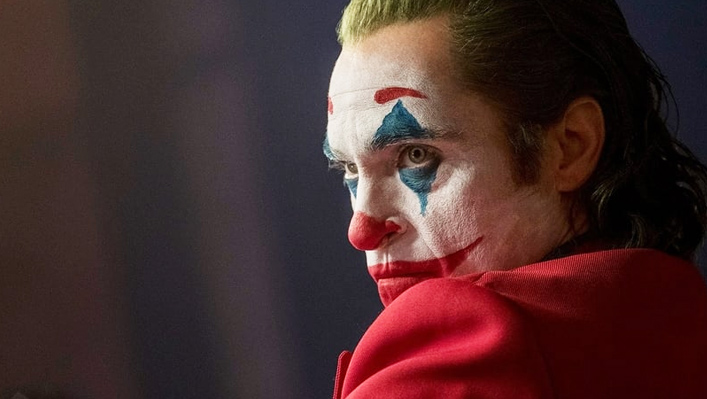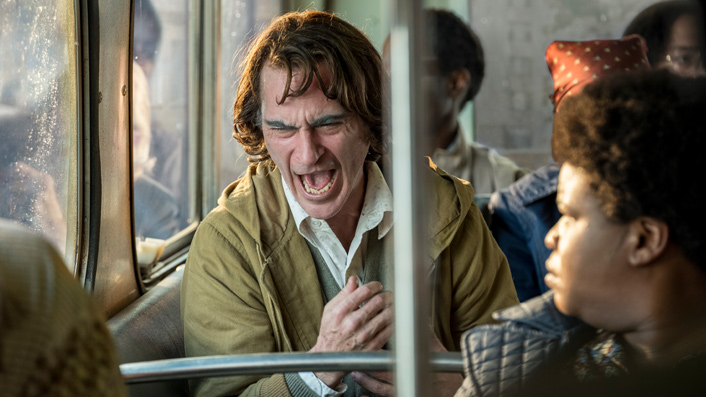Early look review: Joker is a provocation that demands we rethink power and violence

The Joker’s controversial origins story is an unflinching portrayal of a man with severe mental health issues. Alexandra Heller-Nicholas attended its North American premiere at the Toronto International Film Festival.
The word “problematic” boomed through social media megaphones even by people who had yet to see Todd Philips’ Joker after its much-hyped premiere at the Venice Film Festival. But for all the fears of it promoting ‘incels’ (shorthand for the ‘involuntarily celibate’ online subculture linked to real-world misogynistic horrors like the 2014 Isla Vista killings) and the broader extreme right wing movement more generally, the North American premiere that I saw at the Toronto International Film Festival left me with a different conclusion.
Joker is a popcorn movie that makes it virtually impossible to not think politically, as it prompts us to identify the precise social and economic conditions where hate can flourish. What conclusions we draw from that activity, the film arguably leaves largely up to us.
For both casual observers and those more fully indoctrinated into the mythology of the DC canon, Arthur Fleck’s status as arch nemesis of superhero darling, rich guy supreme and enigmatic dark god Batman is common knowledge. Joker is not a loyal adaptation by any stretch, but rather riffs on the raw iconography of the DC universe to create something very much its own.

Starring Joaquin Phoenix in the title role, Fleck is a barely-employable clown-for-hire who struggles with severe mental health issues. The limited support he receives from community services are spread so thin it barely manages to keep him afloat. And when a series of complicated events unfurl in rapid succession, the thin grasp Fleck has on reality begins to disintegrate.
As the film makes explicit, from garbage strikes to healthcare budget cuts, Gotham City is a town in crisis. Fleck’s situation therefore both is and isn’t unique. When his clown mask becomes the symbol for a burgeoning anti-establishment uprising, it collides with spectacular results with his until-then thwarted ambitions to become a successful stand-up comedian.
Of all the characters from the DC universe, so enduring is the figure of the Joker that the instant go-to image we have in our minds when thinking of the character when adapted to the screen marks our age like the rings of a tree. Do you think of Cesar Romero from the gloriously camp 60s television series, Jack Nicholson from Tim Burton’s 1989 Batman, Heath Ledger from Christopher Nolan’s The Dark Knight from 2008, or even Jared Leto from David Ayer’s 2016 movie Suicide Squad?
But there are alternative routes into Joker. More than one critic, for example, has drawn parallels with the work of Martin Scorsese (Taxi Driver and The King of Comedy in particular, the latter underscored by the casting of Robert De Niro as a late night TV talk show host).
Yet Joker might be even more productively framed through Phoenix’s lead performance in Lynne Ramsay’s powerful 2017 film You Were Never Really Here. Like Joker, it is an unflinching psychological exploration of a man with severe mental health issues who has fallen through the cracks of the system, an adult man living with his aged mother whose turn to violence speaks as much of a broken society as it does provide the bare-bones plot set-up for a character study of a killer.
While the references to The King of Comedy are almost playful, thinking about Joker through Ramsay and Phoenix’s collaboration on You Were Never Really Here – regarding how the two diverge as much as overlap – renders it almost haunting. There’s an unsettling feeling we’ve been here before, well beyond the terrain of the superhero blockbuster. While the two films play out differently (and, notably, are intended for different audiences), the terms of engagement are significantly alike.
It is in this sense that one can almost speculate if the controversy surrounding Joker would be as strong and as vocal if it was disconnected from the DC branding, and wasn’t intended to appeal to a mass audience. If Fleck didn’t turn to the iconic green hair and the purple suit would we be so nervous? That there is genuine concern about the film provoking violence is not unreasonable in this sense – it is close to impossible to pursue this line of questioning and not recall the horrendous 2012 Aurora cinema shooting during a screening of The Dark Knight Rises, for example.
Ultimately, the bigger questions Joker poses hinge on our how we understand Fleck’s journey: is it a celebration of vigilante justice, or a brutal exposé and condemnation of a world that leaves damaged, exploited people with the belief they have no alternatives beyond violence?
Regardless of our political interpretation of the film, Joker seems consciously designed to provoke. It demands we think about power, difference and violence in ways we do not necessarily expect a heavily branded mainstream blockbuster to do so. This is its challenge, and for better or for worse, even before its widespread release, it has accomplished precisely what it set out to do.

















